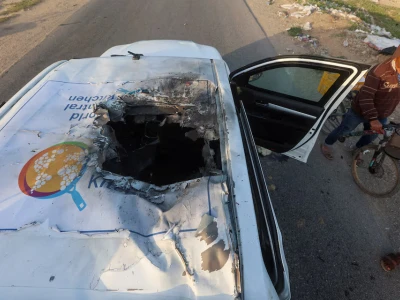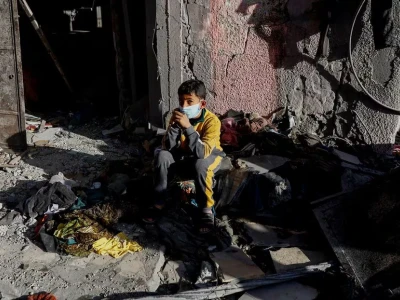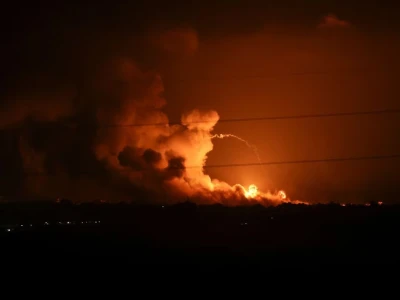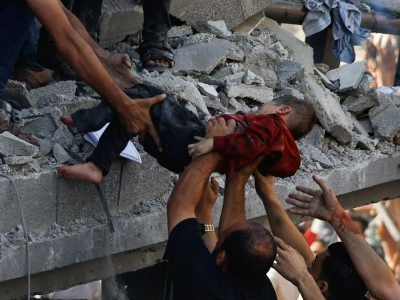
Emergency convoy reaches Gaza, Israel says it will intensify strikes
Before the outbreak of conflict, an average of about 450 aid trucks were arriving daily in Gaza.
GAZA/JERUSALEM, Oct 21 (Reuters) - A long-awaited convoy of trucks carrying humanitarian aid crossed into southern Gaza on Saturday for the first time since Israel began a devastating siege 12 days ago, as Israel's military pounded northern Gaza and warned it would increase its attacks.
U.S. President Joe Biden cheered the arrival of the aid after days of intense negotiations and said the United States was committed to ensuring more assistance would enter via southern Gaza Strip's Rafah border point with Egypt.
"We will continue to work with all parties to keep the Rafah crossing in operation," Biden said in a statement.
Twenty flatbed trucks, flying white flags and honking their horns, exited the crossing after checks and headed into Gaza's southern area which includes the major towns of Rafah and Khan Younis where hundreds of thousands of people made homeless by Israel's unrelenting air war are sheltering.
Israel's "total siege" of Gaza, launched after the Oct. 7 cross-border attack on southern Israel by militants of the Islamist movement Hamas, has left the enclave's 2.3 million people running out of food, water, medicines and fuel.
Palestinian officials were disappointed that fuel supplies were not included in the consignment of food, water and medical supplies and added that the aid was only 3% of what used to get into Gaza before the crisis.
"Excluding the fuel from the humanitarian aid means the lives of patients and injured will remain at risk. Gaza hospitals are running out of the basic requirements to pursue medical interventions," the Gaza health ministry said.
The United Nations said the convoy included life-saving supplies would be received and distributed by the Palestinian Red Crescent, with the consent of Hamas, which rules Gaza.
U.S. Secretary of State Antony Blinken welcomed the opening but echoed a warning from Israel that no aid should end up in Hamas hands.
"We have been clear: Hamas must not interfere with the provision of this life-saving assistance," Blinken said in a statement.
U.N. officials say at least 100 trucks daily are needed and that any aid operation must be sustainable at scale - a tall order with Israel carrying out bombardments day and night that have wrecked entire populated districts.
Before the outbreak of conflict, an average of about 450 aid trucks were arriving daily in Gaza.
NO BREAKTHROUGH IN CAIRO
Diplomacy to secure a ceasefire has been fruitless so far.
Arab leaders at a hastily convened Cairo summit on Saturday condemned the Israeli bombardment of Gaza as Europeans said civilians should be shielded, but with Israel and senior U.S. officials absent there was no agreement on containing the violence.
Israel had kept up air strikes on targets around Gaza in Saturday's early hours after Prime Minister Benjamin Netanyahu vowed to "fight until victory" following the release of the first two hostages by Hamas.
Israeli military spokesperson Rear Admiral Daniel Hagari warned the strikes would intensify in the north, and called on Gazans to move south to get out of harm's way.
"For your own safety move southward, we will continue to attack in the area of Gaza City and increase attacks," Hagari said in a briefing to Israeli reporters.
The humanitarian aid that has entered to UNRWA, from Egypt, we are supervising it to ensure that the water medicine and water are distributed in this humanitarian area we have set."




